|
What the pampootie?!
Yes, Random Words Good Good Word Of The Day is: Pampootie. The Pampootie is neither an off-brand disposable diaper nor the requisite, frivolous second-act show tune from a failed Broadway musical. Pampootie is a kind of footwear. And probably not the quality footwear blessed by St. Hubbins. (If you get the reference, you know who you are and probably saw such shoes dancing around Stonehenge. But I digress.) Pampooties come to the world from their humble origins in the Aran Islands of County Galway, Ireland. It’s a sort of medieval pre-tech footwear of the kind nobody ever stood in line for as if they were Air Jordans. In fact, there’s a good chance nobody ever really wanted pampooties at all, as they were prone to rot. As the shoes were made from untanned hide, Ireland’s damp climate could wreak havoc upon the footwear of the populous. A new pair of pampooties were expected to last about a month. Moreover, the pampootie was made from the more sturdy hide of the animal’s buttocks, so there’s that. Instead of Air Jordans, it seems doubtful anyone was marketing Air Buttocks. And with a life expectancy of a month only, how often would the styles be changing and the kids demanding their new Air Buttocks? “Mom! I needs me some new Air Buttocks! Seamus next door already has his, and they have the awesome new butt-hair soles!” Yes, early footwear innovation: the pampootie was often made with the hair of the buttocks left on the sole for better traction. Held together with twine or a leather strap, the pampootie is the forerunner of a shoe you may have seen in action, though may not have known as ghillies. Remember these are shoes as opposed to the suits worn by special forces soldiers as camouflage. Effective at hiding from the enemy, the ghillie suit is hard to dance in. And dancing is where you’d have seen the ghillie shoes. You’d have witnessed these shoes in action as the official Air Dance footwear of a touring company that dances up a Celtic storm, forcefully slapping the stage with their modern Air Buttocks slap shoes. Yes, the butt hair may have been replaced with rubber for purposes of contemporary convenience, making one wonder whether that rubber comes from the bouncy buttocks of the rubber tree and is the hair that’s not used for the shoe instead used to stuff pillows? Hard to know. But one can probably rest assured that the butt-rubber soles are better for dancing with abandon. Um, how did we get here? Oh, yes, Random Words Good Good Word Of The Day: Pampootie. Put that in your pampootie and kick it. Cheers, Blaine Parker Your Lean, Mean Creative Director in Park City LIGHTNING BRANDING ON AMAZON The Kindle edition of our new book is now available at Amazon for the REDUCED bargain price of $9.95 For details about our new Lightning Branding courses, both do-it-yourself and we-do-it-with-you editions, click here. (There's even a video of us!)
0 Comments
Now that the holidays are officially upon us, what with the floodgates of Thanksgiving fully opened and allowing us to be excessive in all things related to familial celebrations, it seems a good time to unwrap the gift of a good word that doesn’t get to trot its stuff as often as it should.
We’re speaking, of course, of that wobbly kneed adjective born of the less-popular middle-English transitive verb, “Besotted.” Yes, perhaps your head is saying to you, “Oh. That. We remember that, don’t we? Ouch.” Or, perhaps your don’t remember due to an excess of besotment. UFO conspiracy theorists call it “lost time” and blame it on abduction by aliens. It can happen this time of year. (Besotment, that is. Alien abductions, less so.) Somewhere between the turkey and the football, somewhat more alcohol is served than is advisable, and someone among your party not you weaves across the floor to your position, grabs you around the neck with his arm and begins blubbering into your shoulder, “Love ya, man!” Here's the enjoyable irony of that little vignette. “Besotted,” which is commonly construed to mean alcohol intoxication, comes from a different etymological root: it means “infatuated” or being made to appear foolish or stupid because of infatuation. The prefix “be-” represents being caused to be something, and the wet, heavy root word “sot” lands with splat, coming from the equally heavy and wet sounding middle-English noun “sott,” meaning “fool.” So, the inebriant who is besotted by drink and hooks you around the neck to serve a heaping helping of “Love ya, man!” upon your person is also besotted by his love for you despite the fact that you married his sister and owe him money. (Though, not for marrying his sister. The money was for an altogether different transaction.) In fact, the earliest known use of the word “besotted” is in a poem from 1597 in which the narrator is head over heels infatuated with a stranger and describes himself as so foolishly “besotted” that he’s like the guy who was cuckoo-for-Cocoa-Puffs enough to get busy with Clytemnestra while Agamemnon was at war. Sorry, was that too arcane? Forgive me. I’m no scholar of Greek literature. I merely know enough classical references to appear boorish at cocktail parties whilst upon the road to besotment. Anyway! As the post-pandemic holiday season gets into full swing and the fools among us continue to get themselves thrown off of commercial airliners for violations of decorum that bring into question their mental health, enjoy your favorite intoxicant in moderation, whether it be sugar, sweet emotion, or that fallback beverage of the classical texts, wine. And please do so in moderation so that when you’re asked how the office holiday party was, you can cheerfully reply, “They were a besotted lot” with no reference to yourself, either as an inebriant or as an overly emotive fool for the holiday. Gobble. Cheers, Blaine Parker Your Lean, Mean Creative Director in Park City LIGHTNING BRANDING ON AMAZON The Kindle edition of our new book is now available at Amazon for the REDUCED bargain price of $9.95 For details about our new Lightning Branding courses, both do-it-yourself and we-do-it-with-you editions, click here. (There's even a video of us!) Careful. Copy.
Words fail me. I don’t know what to say. So I’m just going to blurt it out. “Avoid diabetic amputations without surgery.” That is what the copy says. On a billboard. A giant billboard along an interstate highway. How did that headline get past everyone involved in a multi-thousand dollar media purchase? “Avoid life-changing disfigurement without cutting off your leg!” “Avoid doing without doing!” It’s so bad, it’s almost like a Zen koan. If a tree surgeon is amputating in the woods and no patient is there to be cut, does the limb make a sound? And what is the sound of one hand slapping the advertiser? Here’s the problem: there IS something important in the thinking behind the headline. But you wouldn’t know it from the inept wording. If you’re going to lose a foot or a leg to diabetes, you might already know there are surgical alternatives to amputation. There’s also a NON-surgical alternative to amputation. But to say, “Avoid doing by not doing” is a construct destined to fail because it spins the head around. How about, “No amputation AND no surgery!” That’s not great, but it’s better. “The non-surgical alternative to diabetic amputation.” That’s more clear, though not catchy. “Can a simple injection save you from diabetic amputation?” For the moment, that’s the headline I’m choosing. If I think more about it, maybe I can make it better. Backstory: I’ve been thinking about this on and off for a couple of months. I saw that billboard somewhere in Virginia about 10 weeks ago. It’s been nagging at me ever since. I tried googling the headline to no avail. Then, I thought about what the headline was really trying to say. If I’m avoiding without doing, what is it that I’m NOT doing? I finally searched for “surgical alternatives to amputation.” Lo and behold: there are surgical alternatives to diabetic amputation. They’re also often ineffective and problematic. Which is why some guy with a biomedical engineering background came up with an injection treatment as an alternative. That alternative treatment works better than surgery. It also helps avoid amputation. (Yes, I "researched" in all of three minutes. Peer reviewed by me!) Is that injection procedure what we’re selling here? I dunno. But it makes sense. Because it represents the right form of avoiding without doing. Is it possible the prospect will understand the original headline on the billboard? Yes. Is it more likely the prospect will be as confused as I was? Yes. When you’re driving past a billboard at 70 miles an hour and are told to avoid something without doing something else, you don’t have time to process that message and figure it out. It’s a complicated and unclear construction. A billboard needs words good and simple. Heck, not just billboards. Most written thoughts can benefit from good and simple. Gymnastics are not conducive to clarity. Clear up what you’re saying and you’ll sell more. Maybe an easier way to think of this is: your writing is entering into a conversation the prospect is already having. Speak to that prospect in words that sound like his or her conversation. All it takes is the time required to make it shorter, make it sweeter, and make it sing. Words good. And simple. Cheers, Blaine Parker Your Lean, Mean Creative Director in Park City LIGHTNING BRANDING ON AMAZON The Kindle edition of our new book is now available at Amazon for the REDUCED bargain price of $9.95 For details about our new Lightning Branding courses, both do-it-yourself and we-do-it-with-you editions, click here. (There's even a video of us!) I AM FILLED WITH GRIEF.
Well, perhaps that’s an overstatement. I am experiencing a modicum of grief. Hmm. Maybe that’s dancing around it. The words are a little cold. I’m bummed because I killed another one. Well, at least that reads like my words. Words that flowed from my own pen. Are these words good? Hard to know. But let’s look at where we are and what has transpired to inspire this muddled meditation on a minimal manifestation. You know what’s dead? Another Moleskine notebook. It was a gift from my long-suffering wife (she’s married to yours truly after all), along with the rather nice pen with which I’m scribbling these words into a newer, lesser notebook. And lemme tell ya, this is not the same. The paper is scratchy. The cover is flimsy. The density is unconvincing. The way it feels beneath the pen and even the sound it makes when you handle the pages.... One of these things is not like the other. One of these things is not "luxury." If you are unfamiliar with the Moleskine notebook, if you missed one of my long ago rants about the joy of longhand lex on pulp-derived paper product, well… Let’s just say you’ve seen this notebook. There’s always somebody somewhere, in a Starbucks or at the conference table, who possesses this marketing marvel. And yes, the Moleskine is indeed a marketing marvel. It’s an expensive notebook that is sold on the backs of the Lost Generation. Some of the marketing hints that these are the same notebooks used in 1920s Paris cafés by struggling American writers with names like Fitzgerald and Hemingway as they scribbled notes for the nascent gems that would become their greatest works before finally dying of alcohol-induced arterial sclerosis or a self-induced gunshot. (Romanticizing the Lost Generation is a dangerous thing. They led mythologized lives that never worked out well on the other side of the myth.) In reality, the fabled Moleskine is a “luxury notebook” that has little to do with the Lost Generation. The company was founded in 1997 in Italy by Francesco Franceschi, and there’s been some consumer debate about “deception,” with this luxury Italian product being produced in China. I have not substantiated the China part. Whatever. Despite the lies, the words bad, and any other drivel that might ensue, the notebook is an honest product. And I still lament the loss just a little when I come to the end of a Moleskine. At the end of this last one, I was writing on behalf of a client. She’s a nice woman in New Hampshire, a doctor of audiology much beloved by her patients and staff. The last lines on the last page of the notebook are: The art of listening. The way you hear it. Changing perceptions. I didn’t even write those things. Honey did. I transcribed as she spoke them. (I do think “the art of listening” has a certain genius to it. It probably won’t make it into the marketing, but it deserves to be somewhere.) But that’s it. The end of the notebook. This morning, in the grayish dark of the pre-dawn Mountain West, I sat down to write about words. And I realized I feel bad because I can’t do so on that foolscap friend that kept me going lo these many months. A tiny grief, perhaps, as I scribble away in this new, lesser livre, bad metaphors and lousy alliterations and all. I miss my old notebook. But I love that my wife gave it to me. And more important, I love my wife and she still puts up with me, so there’s that and everything is relative. Words good. Notebook dead. Life endures. Win a notebook! Yes, you can have your very own copy of a brand new, not-a-Moleskine notebook. Just reply to this email and answer the question: Were these words good, bad, or middling, and why? Just one sentence. The respondent with the best answer wins a brand spanking new notebook for the pleasure of writing like the Lost Generation in Paris cafés minus the Moleskine, the café and the challenges of Paris. The best runners up will be published in a forthcoming Words Good, so be creative and pull no punches! Make me laugh! (Better yet, make Honey laugh.) Enter before midnight on Friday, October 1, 2021. Cheers, Blaine Parker Your Lean, Mean Creative Director in Park City LIGHTNING BRANDING ON AMAZON The Kindle edition of our new book is now available at Amazon for the bargain price of $19.95 For details about our new Lightning Branding courses, both do-it-yourself and we-do-it-with-you editions, click here. (There's even a video of us!) CREATIVE THINKING THAT INSPIRES, SURPRISES, DELIGHTS, AND DELIVERS A DESIRED RESULT.
At its best, that is what good writing is. Opinion? Perhaps. But it’s one of the reasons why advertising copywriting is so much fun. You get to weaponize words on behalf of your client, often blowing up the client’s bottom line in ways that are not possible using other means. But it’s not just about getting the words on paper. It’s about everything leading up to that. And sometimes, there are no words on paper at all. That’s why the peaceful screed colors outside the lines. It’s not just about writing the words. It’s about taking actions that inspire, and being inspired to take action that fuels words. It’s a productive cycle of energetic genesis. Good writing is good thinking. Good thinking makes things happen. Which is why we’re about to talk about a dive bar. (Yes, it’s a left turn. Go with it.) The Fabulous Honey Parker and I have many hobbies. One of them is dive bars. Dive bars are fun, in part because they’re often a place full of surprises and unusual people. Yes, sometimes there might be that loud, drunk woman with a voice like the angry laughter of an enraged crow perched on barbed wire, screeching and cawing about the ball game on the TV. You might also meet the retired schoolteacher who’s a millionaire real estate entrepreneur with a portfolio of local residential rental properties (and a much nicer laugh than the crow lady). You might meet a local criminal attorney who’s still wearing his suit from court that afternoon. Or the software engineer, sitting with his phone out, reviewing updates to a program under development. These people are there, and none of them know your name. Yet. Right now, they’re on the Mississippi Gulf Coast in a little dive bar with a fishing theme. Fishing happens around here. Dive bars, though? Not as often as they used to. It’s an artsy little town that has undergone a degree of gentrification. As one old-timer local told me, he’s just about the last of his friends who lives here. The place has become too fancy. Nonetheless, some of the dive bars persevere. They are dimly lit places with dark wood furnishings, out-of-state license plates on the walls, dollar bills tacked to the ceiling, and various surprises hidden throughout the (ahem) decorating. This Mississippi dive bar is different. Yes, it’s filled with local characters. But it’s also nationally recognized. It is lauded as one of the nation’s best dive bars. And it happens to be a pandemic survival story. Hello, pivot! One of the big selling features of this bar is they have an excellent low-country boil. If you’re not familiar with low-country boil, it’s some form of seafood (usually crawfish, shrimp or crab, or a combination thereof). The seafood is boiled in abundant spices along with sausage, corn and potatoes. That’s the traditional lineup. My personal boil recipe includes a rotating cast of green veggies to help dispel one’s overriding sensation of guilt that comes from scarfing down potatoes and corn alongside crusty bread, all with no greens. A boil is often dumped out onto a communal table and consumed with one’s hands. Beer is often in evidence. A good low-country boil makes people’s heads explode. And during pandemic lockdown, there was no boil happening inside this bar because nobody was allowed inside this bar. So the owner decided to give people something he felt they needed: a way to get boil takeout. Despite no formal drive-thru architecture (it’s a dumpy old stucco building covered in banners and beer signs), this man turned his bar into a drive-thru boil emporium. The inside of the bar was filled with boil pots, takeout containers and crawfish. A new banner outside proclaimed “Crawfish boil drive thru!” And people drove through, driving away with boiled low-country comestibles. This man’s revenue also went through the roof. And no, he’s not a writer. He owns a bar. He did write a simple sign advertising his product. He also wrote some simple, fun Facebook posts showing his promise of masked-up drive-thru boil. They featured a giant photo of a crawfish waving his claws, saying “You want some of this?!” And it was good. And profitable. Good writing is good thinking. Good thinking makes things happen. It’s thinking beyond the page. Good writers are often cogitating on the world, and how to put thoughts into action. Sometimes, that action is a pen across the page. Sometimes, it’s realizing how to best serve the customer. And sometimes, it’s just going into a strange new dive bar somewhere and seeing how other people reinvent their world, one dimly-lit, laughter-filled encounter at a time. Cheers, Blaine Parker Your Lean, Mean Creative Director in Park City LIGHTNING BRANDING ON AMAZON The Kindle edition of our new book is now available at Amazon for the bargain price of $19.95 For details about our new Lightning Branding courses, both do-it-yourself and we-do-it-with-you editions, click here. (There's even a video of us!) OBVIOUSLY, THIS IS A DUMB MISTAKE
Write with more impact! More punch! More zip and zest! More verve! But, how? What magic must there be in making words sizzle on the page, and perhaps leap from an announcer’s lips as if frantic newts scampering away from a hot griddle of garter snakes? Obviously, you have no idea. But one of the first, obvious things to do is stop using a word like, “Obviously.” Want to see? Look at how much punch is in this one line after removing the adverb: You have no idea. That word is obviously standing between your idea and your reader. We’re going to call that word a “crutch word.” It’s one of those words that we lean on every day because it’s there and it’s easy and we got used to it when we were small children. Another word we got used to as even smaller children was, “Goo.” As in, “Goo goo.” We stopped saying that one. Is it not time we stopped goo’ing up the works using words that don’t move things along? Should we not stop allowing our words to slump and slumber? Shouldn’t we stop dragging our fat sentences across the page like lead-filled plaster casts of broken body parts? Instead, why aren’t we vaulting into the air on vital, rippling musculatures of verbal lean? And is that preceding paragraph awful? Yes! But you’ve read this far. Why? Two reasons. One, there’s an initial promise of something better and more profitable. Two, that paragraph was not expected. It’s fast. It flies. It surprises. And it doesn’t do that by leaning on crutch words like, “Obviously.” As has been established in previous episodes of this missive, one must write fast—even if it means committing grammatical transgressions like “fast,” which ought to correctly be an adverb like quickly or (less correctly) “fastly.” (Good grammar is optional if the impact is more important.) Write! Write as quick as silver streaks across a red hot skillet. Whatever that means. It sounds fast. Then, after writing, one must edit. Edit it. Ed-it. Edit. Let’s say you’re writing a 60-second radio script. That needs to be about 150 words of comin’ out swingin’. It might be swingin’ like a punch-drunk fighter in what will be an unfortunate face-down situation on the canvas. Or it might be swingin’ like a big band in front of a floor full of hep cats cuttin’ a rug to all that jazz, daddio. Or it might be swinging like an old tire at the end of a knotted rope tied to the branch of a grandaddy oak tree on a steamy summer day where the only respite from the swelter is in the shade of that green, leafy canopy while mom makes an icy pitcher of lemonade and a lazy banjo plinks away in the background. Three different ways to swing. But not one of them says, “Obviously, you want to swing.” Or, none of them says that right now, that is. Earlier, a crutch word may have been in there, back when your relentless scribe was in a speed-writing brain dump onto the page in an effort to puke up anything that might make sense here. After the dumpage, I went back and used my pen like a surgeon’s scalpel, slicing away the fat and bother. If you want more punch in your prose, you can’t saddle it upon the threadbare horse blanket of words that don’t spur it into action. What words are they? We’re talking about words like, “Obviously,” “Actually,” “Basically,” “Literally,” (which is literally almost never used properly), “So,” “Well,” “Look,” “Awesome,” (almost always never true), “Seriously,” “Totally,” “Essentially,” “Really,” “Just,” “Right,” and “Very.” Oh, and let’s not forget that super-annoying crutch word of the 21st century... “Super.” AUUGGHH! There, I said it. Super awesome or what? Write your brain-dump blather draft. Then, make it make more sense. After that, go through it again and ask yourself about every single word, “Do I need this?” You will often find yourself loaded up on crutch words standing in the way of actual impact, magnitude, swagger or sizzle. Cutting out such words helps your other words talk smack. And while you’re at it, be certain to kill, kill, kill your darlings. There will always be some kind of cuteness in there, all fuzzy and fun and rolling around right in the way of getting things done. And you adore it. Crush it! Squash it like a bug! Execute it with extreme prejudice! What exactly is a darling and how doth one spot it? Good question for another time. I have already overstayed my welcome. Words good. Edits better. Cheers, Blaine Parker Your Lean, Mean Creative Director in Park City LIGHTNING BRANDING ON AMAZON The Kindle edition of our new book is now available at Amazon for the bargain price of $19.95 BUT ON SALE RIGHT THIS MINUTE FOR 3.99! For details about our new Lightning Branding courses, both do-it-yourself and we-do-it-with-you editions, click here. (There's even a video of us!) DON’T BALTER ABOUT, YOUR BEER-SOAKED BABOON!
Yes, today’s Good Word is “balter.” The word "balter” means to dance artlessly, without grace or skill. In other words, it's dancing like a lot of geeky guys do at their junior prom. It might even be how we dance in this missive. Words Good does not claim to bring any particular art to you or your writing. But it does bring a great degree of clumsy enthusiasm. And occasionally, it offers up a fun word without any clear need for that word. However, with a word like “balter,” is "need" really the issue? Balter is about the fun, the thrills, the joy of lex. Words? Good! Balter? Better! As great as they are, you can’t run around plugging big, unusual words like “brobdingnagian” into your everyday conversation. But a word like “balter” can find a home in your daily chatter. Let’s say your friend Walter gets drunk and tries to dance yet again. You can call him Baltering Walter. Perhaps he was even that beer-soaked, baltering baboon at the top of the page. “Balter” is a good enough word that you could even start a whole movement about it. You might start printing and selling T-shirts that proudly proclaim, “Balter on!” and it becomes a thing. As an alternative to the annual spring debutante ball, where fresh young flowers are introduced to society, you’ll begin seeing that annual satirical rite, The Annual Autumn Balter Ball, where besotted balterers celebrate the death of the season among the brown, crunchy leaves of another wasted summer. And just by the way, speaking of trees… Whilst researching “balter” for your dining and dancing pleasure, Google informed me that “People also ask, ‘What is a Dendrophile?’” I had to ask, too. It sounds like something the cops might be able to run a sting for. "Let's nail those disgusting dendrophiles, damn it!" Indeed, knowing something about the word “dendrites” did not inform any further understanding of dendrophilia, which sounds just a little bit dirty. Seems a “dendrophile” is a tree lover. So very quickly, while baltering about with Google, your artless scribe succumbed to the juvenile joys of fabulous phonemes with no regard for usefulness or practicality. Not that there’s anything wrong with that. Anyway, Words Good Good Word for Daily Use is “balter,” to dance artlessly, without grace or skill. Bet you can find a place for it. Cheers, Blaine Parker Your Lean, Mean Creative Director in Park City LIGHTNING BRANDING ON AMAZON The Kindle edition of our new book is now available at Amazon for the bargain price of $19.95. For details about our new Lightning Branding courses, both do-it-yourself and we-do-it-with-you editions, click here. (There's even a video of us!) THE BLANK PAGE IS AN IDIOT.
It will not do as you tell it. If you try asking nicely, it just scoffs. You can try threats. “Hey, paper boy! There’s open flame over here. I have matches, a lighter, even a gas cooktop. I can toss you in and watch you go up in flames and smoke like some kind of inhuman sacrifice to the saints in a witch trial by writers who hate the blankness of your pagery!” Guaranteed: the page will merely look back at you, blankly. It has the upper hand and it knows. “Say something!”, you yell. Nothing. If only you could find the fight that makes this passive ass cooperate in a way that lets you both get on with it and move on to bigger, more profitable problems. This vignette brought to you by Everything Is Nice. But it’s better when it’s not. Do you want to make your writing more interesting? Immediately? Throw it against the wall. Stomp on it. Yell at it. And let it fight back. One reason why so much writing is so flat is that there is so no conflict. People (thankfully) try to avoid conflict in daily life. But one place to embrace the fight is on the blank page. And it doesn’t even need to be the good fight, It can be the nastiest, pettiest, most mean-spirited little spat you ever had. Have a tug of war. Have a battle of wits. Recount a witlessness in which you’re forced to participate. Pine for someone you love who hates you back. Recount the tale about how you use your Jedi lightsaber in heavy traffic against New Jersey drivers. (If you’re from New Jersey, no apologies. Your drivers are offensive zipnods.) Write about the time you were banging heads with someone and it led to blood and stitches. Write about a fistfight and how it feels--especially if you’ve never had one. Fight with sleep and let sleep lose. Writing an advertisement? Describe the deep-seated hatred you feel for the advertiser’s product. When the blank page is mocking you, turn it around. Mock the page back. Show it who’s boss, especially if you feel you’re not. Fake it. Bring the fight and turn the page’s mockery into full cooperation. The blank page is a bully, and a weakling at that. Don’t fight the page. Fight ON the page. Be strong and it will bend to your will. And write more than you need to. It will share the abundance of gems you never knew you had at hand. Cheers, Blaine Parker Your Lean, Mean Creative Director in Park City LIGHTNING BRANDING ON AMAZON The Kindle edition of our new book is now available at Amazon for the bargain price of $19.95. For details about our new Lightning Branding courses, both do-it-yourself and we-do-it-with-you editions, click here. (There's even a video of us!) "What have I done?"
--Nicholson at the Kwai Bridge Indeed, what have I done? This screed is a mess. It all began with a question: What profound gem of copywriting or marketing can I toss your way as a parting thought for 2020 that will change your life in 2021? And the answer: Probably nothing. You are witnessing the not-knowing of writing a regular weekly assignment in an effort to be useful, purposeful and intentional. Sometimes, this exercise is just hopeless. Go ahead. Leave now. Save yourself. Something I’ve found myself doing lately is thinking back. Not with nostalgia, but curiosity. What writers have made me sit up and take note? What writers have influenced my work in one way or another? They are a diverse and intelligent lot, all smarter than I. Some of them you probably know. Ogilvy. Bernbach. Williams. Godin. Gossage. Well, maybe you don’t know that last one. Howard Gossage is a kind of a cult figure among copywriters. He died too young, but still had a profound impact on ad guys as diverse as Goodby Silverstein’s Jeff Goodby and late, great, Guerrilla Marketing guru Jay Conrad Levinson. But there are other, less likely writers. For instance, there’s the late New York Times columnist, Russel Baker. I was in junior high school when he wrote his column about how to carve a Thanksgiving turkey. His prose made it clear how hysterically funny a newspaper columnist can be--especially when he’s not writing about politics. I also remember the opening paragraph to Baker’s satirical piece about televised sports, titled “Kaleidosport.” “For days, we sat at the box mesmerized by sport. We saw the Mets beat the Nets and the Jets, saw Pancho Segura score a hole in one, and watched thunderstruck as Evonne Goolagong came off the bench in the final seconds of play to whip the mighty Nebraska Cornhuskers with a line drive to center field.” That’s just the beginning. It becomes a lesson in crazy. I remember discovering PJ O’ Rourke, known today as a conservative pundit, via an article he wrote for Car & Driver magazine about competing in an off-road rally in the new Jeep Cherokee. In the article, he touted the joys of packing a suitcase while drunk (when you get to your destination, opening the suitcase is like Christmas). He asserted that while Michael Nesmith has zero skills to offer as a rally competitor, he is an excellent conversationalist, and that was sufficient to put him in the car. And O’Rourke’s saying that a hotel-catering shrimp cocktail looked like “a Sea World exhibit gone horribly wrong” was an object lesson in how a simple line of excess can break up a roomful of people. Sometimes, a writer is sticky for just than a single line. For instance, Carl Sandburg’s “The fog comes on little cat feet.” It’s a seven-word gem that is firmly ensconced in my gray matter. In another life, it might have been good ad copy. It's succinct, crystalline and memorable. David Ogilvy is so very quotable. But from his writing, there are two lines that stick with me as quintessential. One is his classic headline: “At 60 miles an hour the loudest noise in the new Rolls-Royce comes from the electric clock.” The other line is an admonition to advertising professionals: “The consumer is not a moron. She is your wife. Don’t insult her intelligence.” Pow! Right in the kisser! (Oh, look. That's a quote from Jackie Gleason.) I can also pretend I read the classics. With that, I will say that Shakespeare has done it for me with one line, but not any of those lines so oft repeated they're now seen as clichés. Instead, it’s Marc Antony’s soliloquy over Julius Caesar’s body: “And Caesar’s spirit, ranging for revenge, with Ate at his side come hot from hell, shall in these confines with a monarch’s voice cry, ‘Havoc!’ and let slip the dogs of war.” No, it's not a cheery sentiment. But not all writing is cheery. Sometimes, it needs to be potent and powerful. (Forgive me for not writing this in the proper format for iambic pentameter.) An equally sticky, deadly line for me couldn’t be from a more different source. It is said by Charles Bronson in the movie, The Mechanic. [SPOILER ALERT.] Mob hit man Bronson has been training aspiring mob hit man Steve. Steve returns the favor by betraying Bronson and killing him. Steve moves into Bronson’s house. He's now living large on the memory of his mentor. He goes to the kitchen and opens the freezer door. In the freezer, Steve sees a note. Bronson’s voiceover reads: “Steve, if you're reading this, it means I didn't make it back. It also means you've broken a filament controlling a 13-second delay trigger. End of game. Bang! You're dead.” And the refrigerator explodes. Cheery and violent! (Monty Python.) What is the point of all this? Let’s call it a New Year’s Call To Action. Write inspired. And know that you’ll find inspiration in the unlikely places. Read what’s evocative. Find words that make your head explode. When words take you by surprise, ask, “Why?” Obviously, you can't copy it. That's called plagiarism. But you can hold it in your hand like a shiny jewel and raise it up to the light and understand what makes it shine. Even bad craft has value. Sit with a group of friends opening their fortune cookies and you see it in action. as they read their fortunes aloud, each person in the group writes something new based on that little slip of bad copy. There is value in raw material all around you. Be informed by it, and it can inform your writing. And your writing is one thing you do that can clearly set you apart. It will let you raise the bar in your service to others. Being surprising enhances the sell. And in your professional life--maybe even your personal life--the loudest noise will be the electric clock. Bang. You’re living large. Happy New Year. Got a favorite inspiring line? Reply to this email and share it. If we get enough, I’ll compile them for another Hot Shots. Cheers, Blaine Parker Your Lean, Mean Creative Director in Park City LIGHTNING BRANDING ON AMAZON The Kindle edition of our new book is now available at Amazon for the bargain price of $19.95. For details about our new Lightning Branding courses, both do-it-yourself and we-do-it-with-you editions, click here. (There's even a video of us!) Making Writing Fun Again--If It Ever Even Was...
Writing with pen and paper. Is it like composing on a piano or guitar instead of a synthesizer? Pounding the keys or plucking the strings instead of turning knobs and flipping switches? I started writing this screed on a computer. How ironic is that? And how much more vital will this missive be made by switching over to the implements of our forebears, replacing the prattle produced in zeroes and ones with the prattle of pen and paper? Maybe not at all. Maybe it’ll still be drivel. But, all this to say… This Christmas, Give Yourself A Writer’s Gift You find yourself writing a lot--or, at least, writing more than you want to be writing. And staring at that blank Word document in the computer sucks out loud. (There. I said it.) I know the feeling. I’ve also been doing something about it. You can, too. It requires giving yourself a gift. It doesn’t have to be expensive (though it can be). It can also change a lot about the way you connect with what you’re required to write. In fact, it might make writing feel like a pleasure again--or maybe even for the first time ever. It’s also going to sound stupidly simple, even ridiculous. You might even hate me for this. Ready? Buy yourself a good, small notebook and a good pen. Then, find yourself a good place for sitting. And writing. My reference standard for writing materials are a grid-lined A4 Moleskine notebook (that’s about 5 x 8 inches) and a Waterman Hémisphère pen with a rollerball cartridge. (The smaller Moleskine is great for carrying in a pocket or purse, and you get to feel like you’re one of those Lost Generation writers cruising the Left Bank.) Yes, a Moleskine and a Waterman together can set you back about 80 bucks. But they’re special. With them, you develop a different kind of connection. You almost feel like you’re sitting in Les Deux Magots across the room from F. Scott as you scribble your next sales sonnet for the new ad campaign. That said, a simple ballpoint and a good Moleskine knockoff can be had for about 15 bucks, and can still make you enjoy what you’re doing with them. So can the venue. In the house, I have a new writing spot. It’s a club chair with a reading lamp and a side table. On the table are two generic ballpoints and four notebooks. When I wake up at 5am, which happens often, I brew up a French press full of Italian roast from an American purveyor (all without creating an international incident), and I sit in the early morning darkness beneath the ring of light from the reading lamp to scribble and scrawl. (My handwriting sucks.) Sometimes, as this morning, I’m making notes for my next non-fiction book. That happens in a Moleskine knockoff that came from Walmart. The notebook was about six bucks. The ballpoint was free. And the resulting verbal pearls are priceless. (IMHO. YMMV. AIPW.)* Other times, I’m reading a book about the anthropology of music and finding parallel inspiration for the creative and psychological processes as they pertain to branding. That writing is happening in a proper Moleskine that I bought years ago, and has been sitting on a shelf, waiting for a little attention. Some mornings, I whip out another Moleskine that’s filled with notes about clients and branding and ads and--yes--drafts for this screed. (!) One notebook is a gratitude journal. As something of a comedian and cynic, this is not an exercise I ever saw coming. But enough intel about this thing called gratitude journaling keeps finding me that I decided to take a crack at it. Who knows? Maybe it’s making me a better person. At the very least, it’s going to give me something else to joke about. Once upon a time, when I was doing stand-up comedy, I was branded as a low-rent Dennis Miller. If this can’t fix that, it can make me more low-rent than I was before. But why does any of this make a difference? It’s the power of pen over Pentium. There’s a connection between your brain, your hand, the pen and the paper that cannot be replicated with a keyboard and screen. Don’t get me wrong. I’ll never give up digital media. They’re here to stay, and they’re a necessary tool. But I find that I’m writing better when sitting alone with the organic components of writing as it used to be. Science also offers insight to back us up on this. Writing with pen and paper engages more of your brain. It excites your Reticular Activating System, which is like the CPU for the computer that is your very being. Everything lights up and comes alive. Writing with pen and paper can establish a more profound emotional connection between you and your reader. You also gain better recall of what you’ve written. Bonus: you’re not distracted by the computer’s siren song to check the headlines or read email. Is it time to turn over a new leaf--literally? Maybe. I know I’m enjoying the process more when I'm away from the computer. My time alone under the light with the pen and paper is visceral in a way computers can’t be. I think about the late, great Hal Riney, who wrote some of his legendary advertising on notepaper in a bar. Some great writers of the Lost Generation used pen and paper. Hemingway used a blank page and a stubby pencil. James Patterson and Stephen King write longhand. Quentin Tarantino, Joyce Carol Oates, Amy Tan and George Clooney are all analog lettering Luddites. Even JK Rowling’s first Harry Potter novel was written by hand. Yes, she was too broke to afford a typewriter or a computer. But if she had used one or the other, how would it have changed the nascent genius that has turned her into one of the wealthiest people on the planet? Want to feel the tiny thrill of wordsmithing that's more exciting and impactful than you expect it to be? Try a good pen and a good notebook. There’s all kinds of scientific evidence to back up the power of analog instruments. And the emotional significance of that special place where you can compose might even make you look forward to the blank page each morning. And if you decide to try this, let me know how it goes for you. I’m curious to hear about your success. Belated Happy Hanukkah. Merry Christmas. Happy Kwanza. Happy National Cookie Exchange Day. Whatever you’re celebrating, have a fabulous holiday. *In My Humble Opinion. Your Mileage May Vary. And It Probably Will. Cheers, Blaine Parker Your Lean, Mean Creative Director in Park City LIGHTNING BRANDING ON AMAZON The Kindle edition of our new book is now available at Amazon for the bargain price of $19.95. For details about our new Lightning Branding courses, both do-it-yourself and we-do-it-with-you editions, click here. (There's even a video of us!) |
AuthorBlaine Parker is prone to ranting about any and all things related to brand. In many ways, he is a professional curmudgeon. While there is no known vaccine for this, the condition is also not contagious. Unless you choose it to be so. Archives
February 2022
Categories
All
|
|
© Copyright 2020 Slow Burn Marketing LLC |
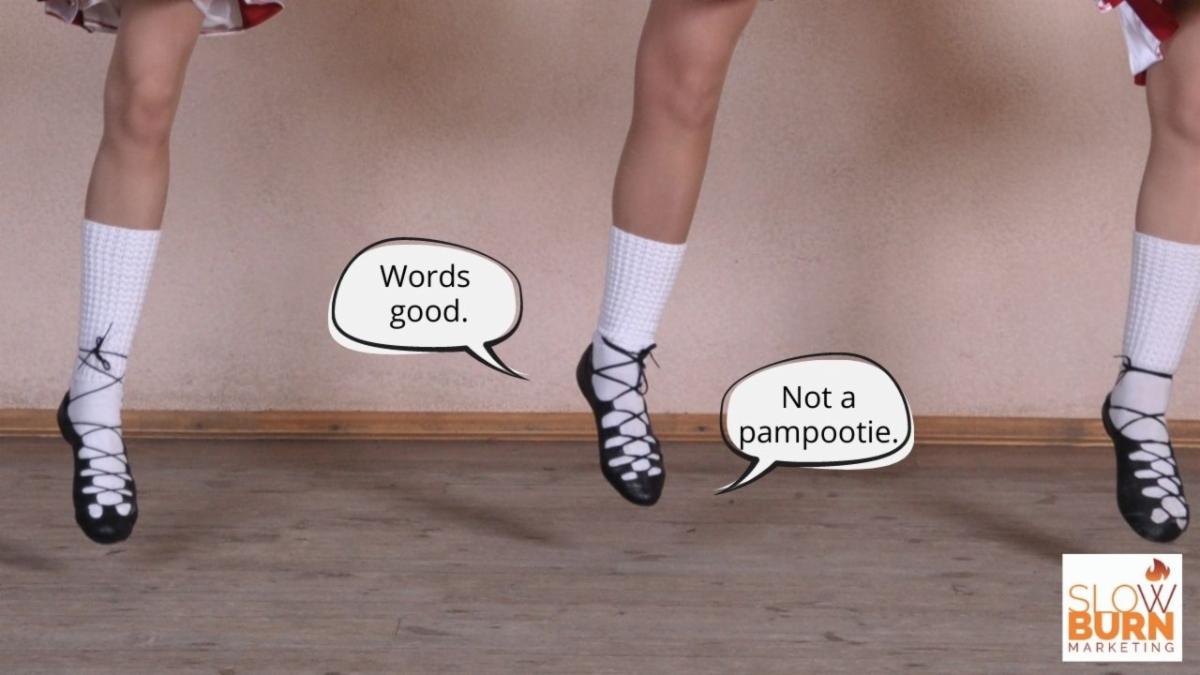
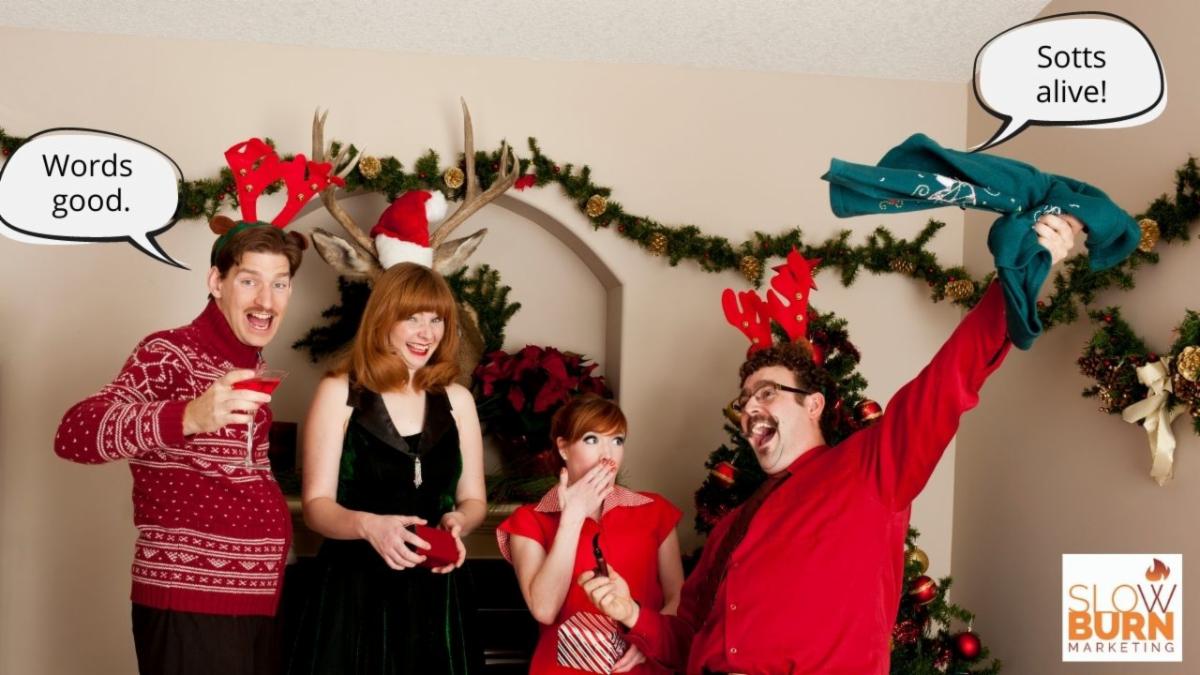
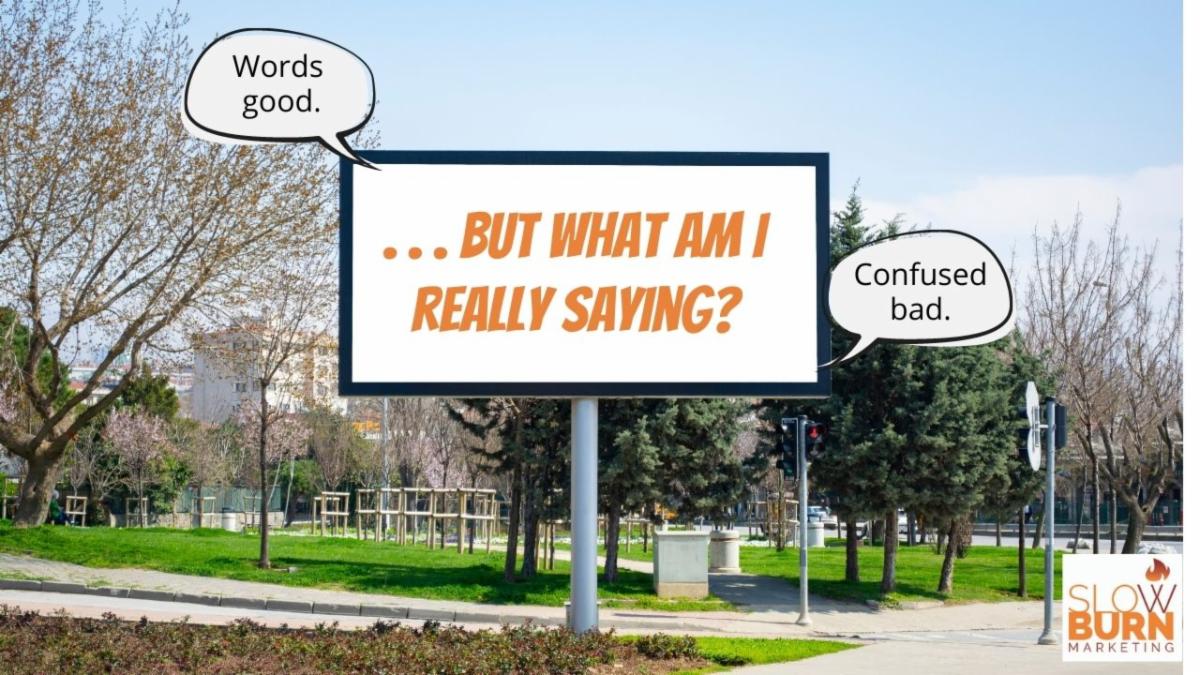
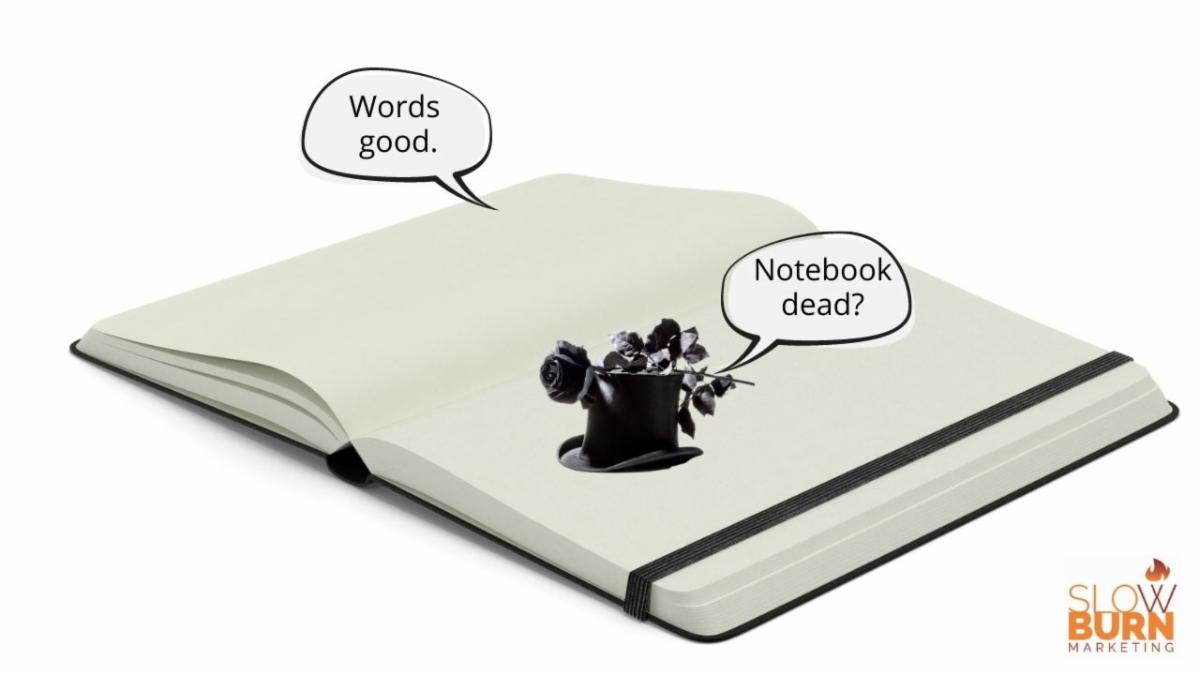
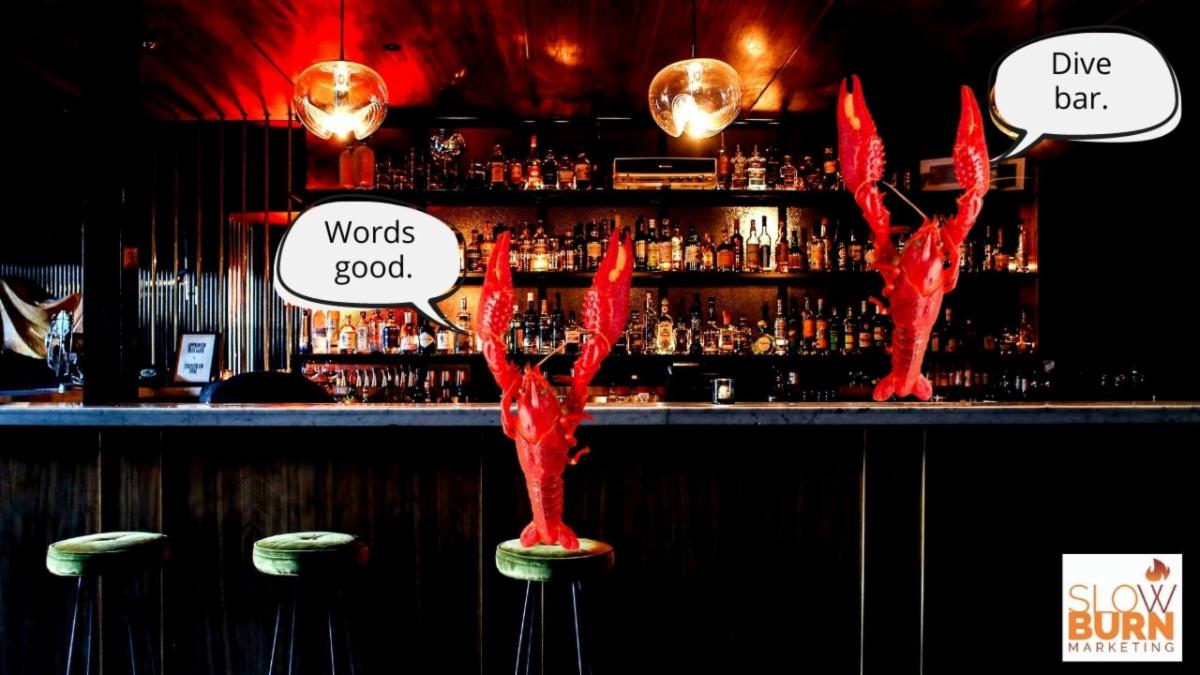
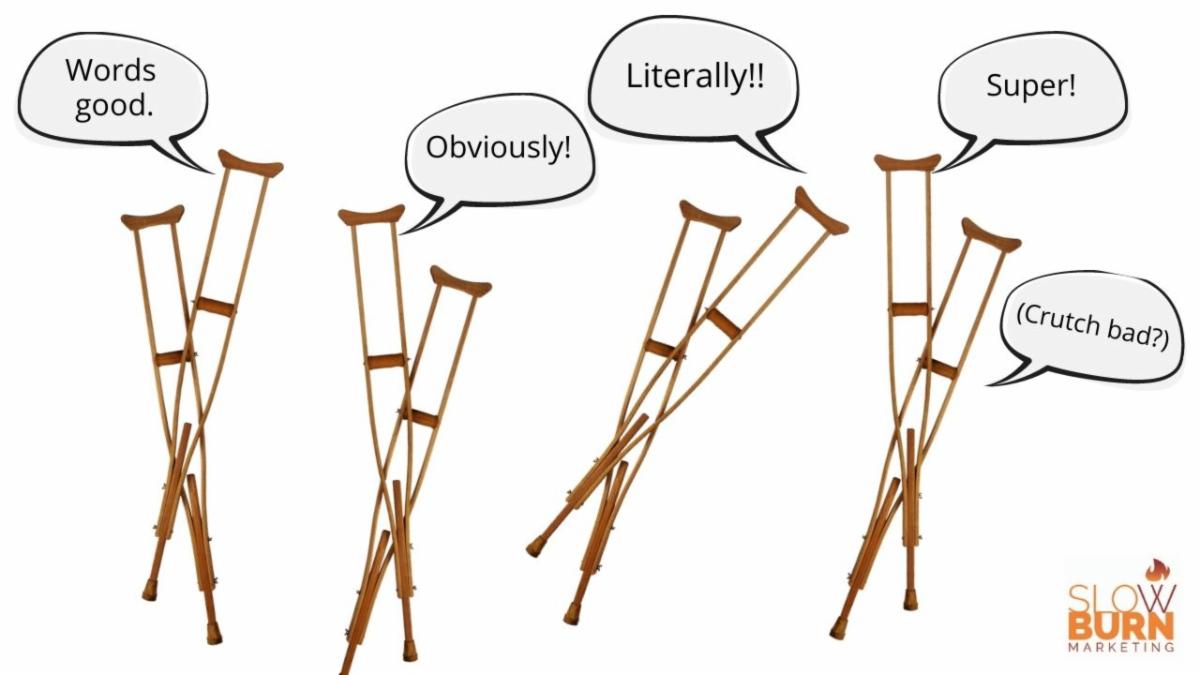
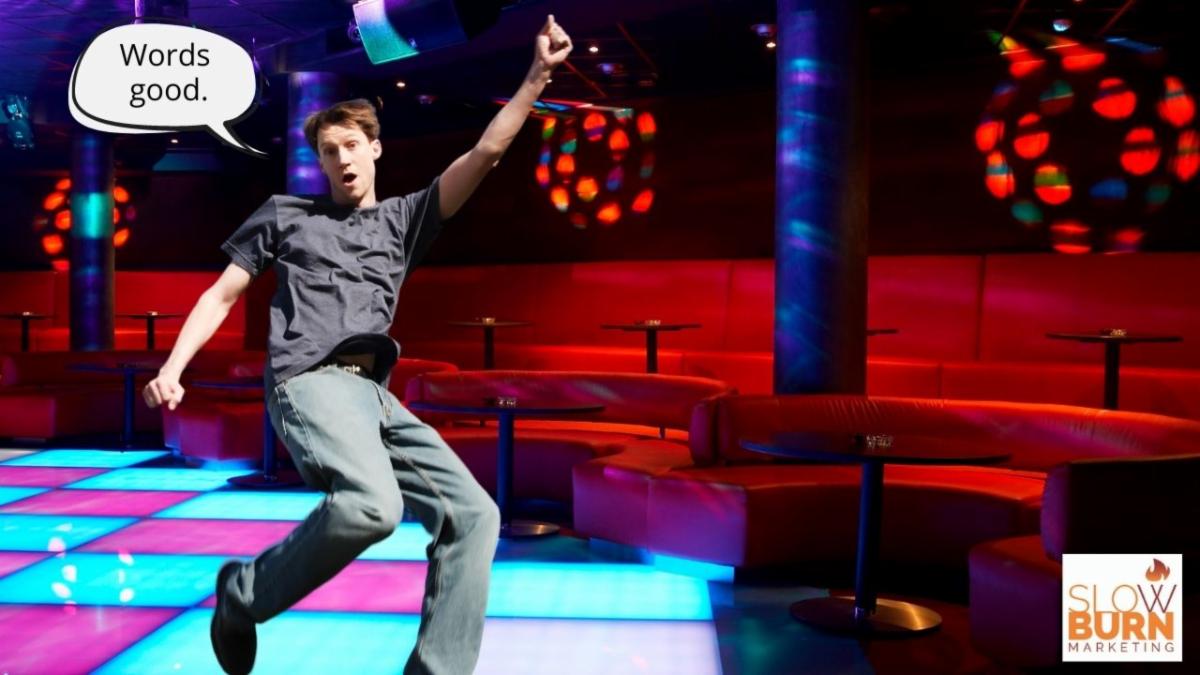
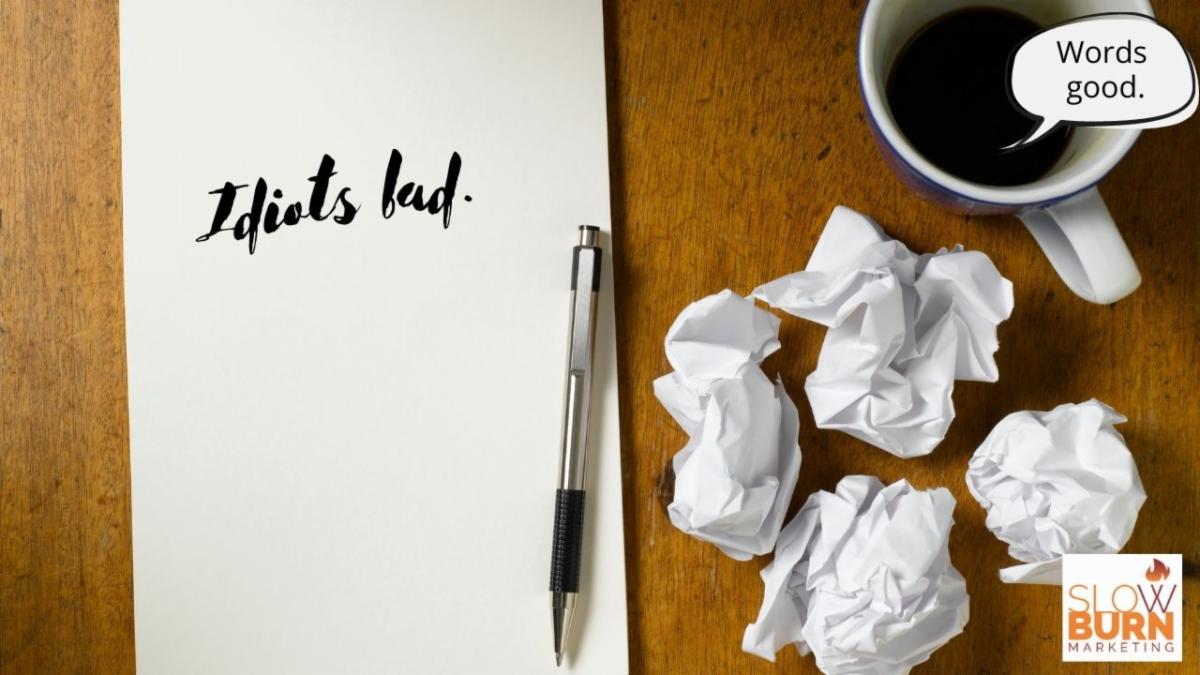

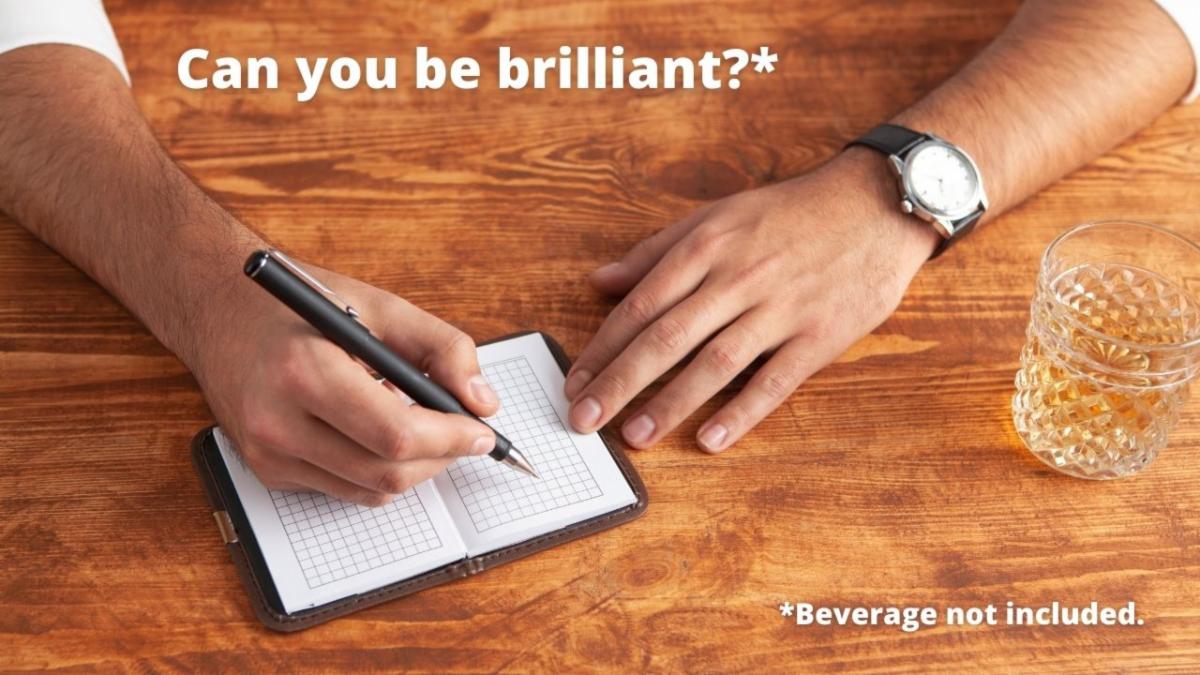
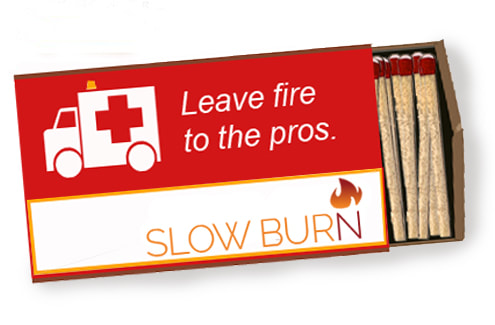
 RSS Feed
RSS Feed

